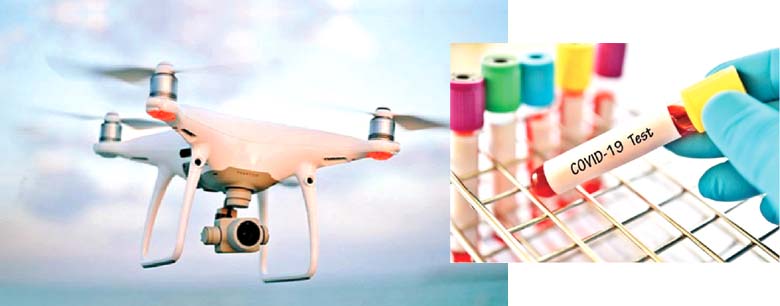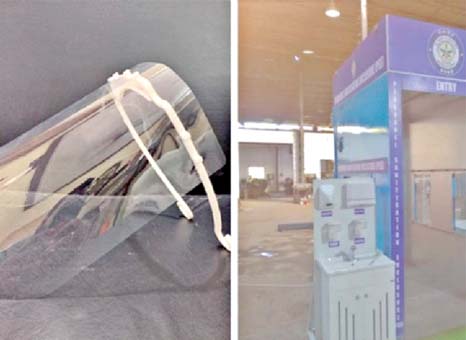The government scientific agencies are not leaving any stones unturned in order to provide full support to the community, researchers, private and public research labs, start-ups, incubators, entrepreneurs and industries
-Jyoti Sharma/ S.K. Varshney

COVID-19, also known as coronavirus, is making people all over the world go helter-skelter and clueless. As per ‘worldometer’, over one million people have already fallen prey to this virus as of writing this and the numbers are increasing thick and fast. Over 59,000 people have succumbed to death and still counting. In India, it has affected over 3000 people and has witnessed about 60 deaths so far.
The World Health Organization (WHO) has pooled in resources and scientists from across the world in its search for a potential vaccine. India is also playing a big role in this at WHO. In addition, thousands of researchers around the world are offering their expertise, time and help through international platforms such as Crowdfight COVID-19 to fight against COVID-19. Researchers are also connecting through social media apps such as Twitter, Facebook, and LinkedIn to provide their services voluntarily.
With no vaccine in sight for at least the next 12-18 months, it seems the fight for rescuing humankind from this deadly virus has only just begun. With no real global consensus on the response mechanism, each nation is left to fend for itself when it comes protecting its own citizens.
India’s quick response
With over 1.3 billion people in Her bosom, the spread of coronavirus in India and India’s response mechanisms are being closely watched over by the rest of the world. Led by the Hon’ble Prime Minister, Shri Narendra Modi, India is battling this virus with all its might. Invoking the Disaster Management Act of 2015, India announced a complete lockdown on 25 March for a period of 21 days. The early announcement of a lockdown, when the infected count was less than 400, was well appreciated by WHO. Setting up of a COVID-19 Task Force and announcement of a series of ‘social distancing’ and other serious measures followed suit. A few such important measures are listed below.
- Started tracing contacts of COVID-affected people.
- Suspended all existing visas (except diplomatic, official, UN/international organisations, employment, project visas).
- Suspended international and domestic flights, trains and bus services until April 15.
- Initiated economic measures targeting the poor so that none goes hungry during this period.
- Converted the coaches of Indian Railways as isolation wards.
R&D Institutions Taking Up the Challenge
While India’s pro-active, pre-emptive, and a ‘whole government’ approach to fighting the COVID-19 pandemic is happening on one side, the slowdown in trade between India and the rest of the world works as counter-productive on the other side. This slowdown in trade is disrupting the supply chains of many essential commodities needed for the fight. The list of such essential commodities includes COVID-19 testing kits, masks, alcohol-based sanitizers, personal protective equipment (PPEs), dress materials for frontline health workers, ventilators (breathing devices) for patients, etc.
The challenge is to produce these as quickly as possible and in bulk. This situation prompted the Government of India to vigorously activate the ‘Make in India’ Programme, and involved various Research & Development (R&D)institutions of the country.
Under the leadership of Dr Harsha Vardhan, Hon’ble Minister for Health, Science and Technology, and Earth Sciences, a well-coordinated approach has been adopted to activate the scientific community of the country. This approach has helped in providing a common platform for sharing of best practices, collaboration of work, development of need-based innovations, and in avoiding duplication of research work. To cut it short, in such a short period of time, India was able to put thousands of researchers in the country to work round the clock to develop new testing kits, protective equipment, respiratory devices, etc.
DRDO develops sanitisation enclosures and face shields

In the ongoing efforts against COVID-19 pandemic, Defence Research and Development Organisation (DRDO) has been using scientific endeavours to develop products in an accelerated manner. The DRDO laboratories are working with industry partners for volume production.
Personnel Sanitisation Enclosure (PSE)
Vehicle Research Development Establishment (VRDE), Ahmednagar, a DRDO Laboratory has designed full body disinfection chamber called as PSE. The system consists of roof mounted and bottom tanks with a total of 700 liters capacity. Approximately 650 personnel can pass through the chamber for disinfection until the refill is required.
The system has been manufactured with the help of M/s D H Ltd, Ghaziabad, within a time span of four days. This system can be used for disinfection of personnel at the areas of controlled ingress and egress such as entry and exit to hospitals, malls, office buildings and critical installations.
Full Face Mask (FFM)
Research Centre Imarat (RCI), Hyderabad and Terminal Ballistics Research Laboratory (TBRL), Chandigarh, have developed face protection mask for health care professionals handling COVID-19 patients. Its light weight construction makes it convenient for comfortable wear for long duration. This design uses commonly available A4 size Over-Head Projection (OHP) film for face protection.
One thousand face shields are being produced daily in TBRL and provided to Postgraduate Institute of Medical Education and Research (PGIMER), Chandigarh. Similarly 100 are produced at RCI and these have been handed over to Employees’ State Insurance Corporation (ESIC), Hyderabad. A demand of 10,000 shields has been received from PGIMER and ESIC Hospitals based on successful user trials.
India’s apex S&T agency and its efforts
Department of Science and Technology (DST) is India’s apex science and technology (S&T) agency. With the help of institutions under DST and sister ministries, DST is taking the lead in coordinating the effort to map and upscale appropriate technologies in India for addressing a plethora of issues related to COVID-19. It is also scouting for solutions that are more relevant to the country and also to help prepare the country for exigencies arising out of COVID-19 pandemic.
DST through its autonomous institutions and statutory bodies has instituted three ways to fight COVID-19:
a) extensive mapping of solutions requiring R&D support, startups with viable products requiring facilitation and manufacturing support;
b) identification of market deployable products requiring seed support; and
c)















Comments